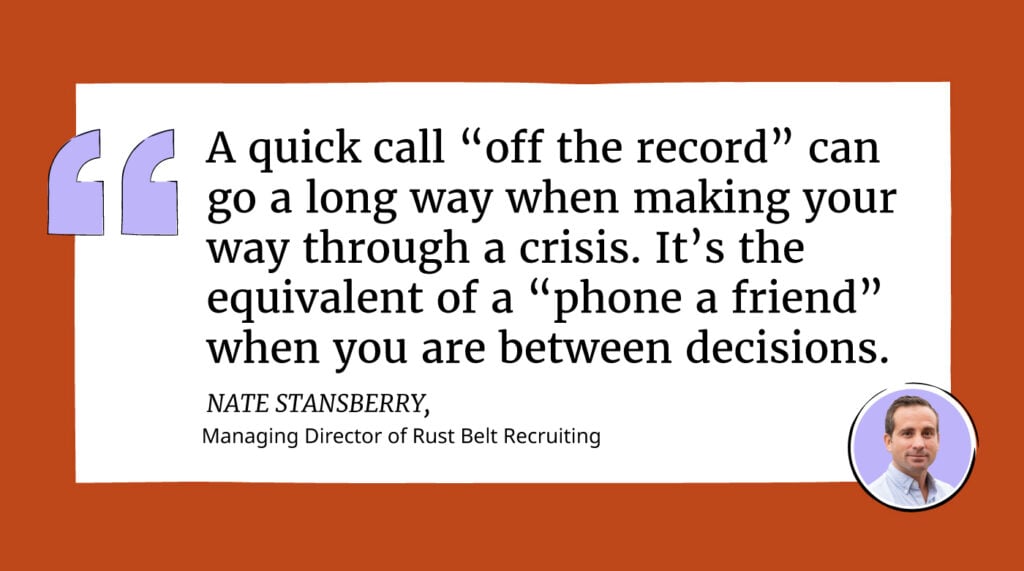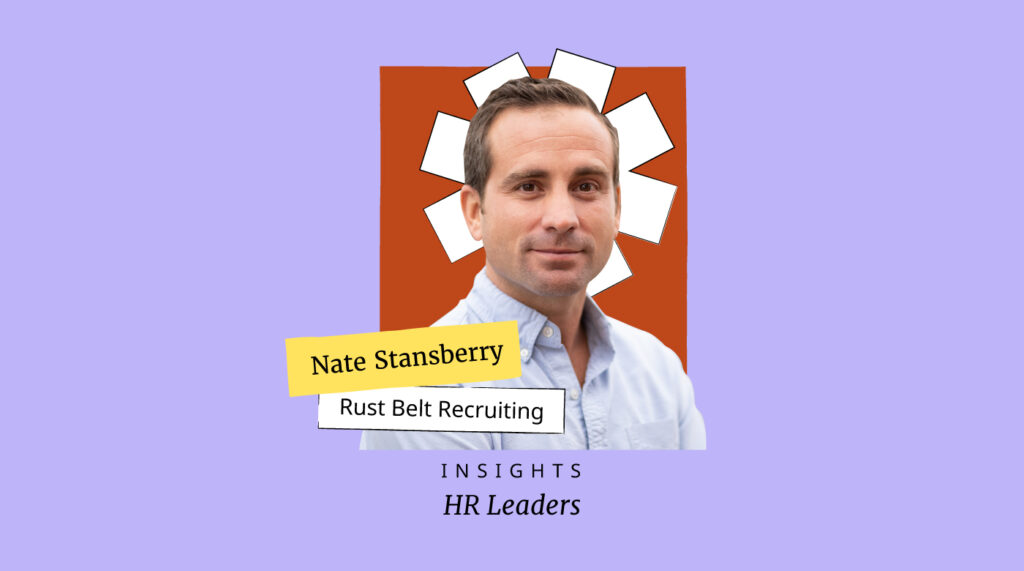As any HR leader will tell you, crises are an inevitable part of the job. Tough situations pop up, and often they’re out of our control. How can companies weather a crisis and turn it into an advantage in the long run? In this interview series, we talk to seasoned HR leaders who share their strategies for weathering the storm and turning a crisis into an advantage.
Welcome, Nate! Before we dive in, our readers would love to get to know you a bit. Can you tell us the “backstory” about what brought you to this specific career path?
I consider myself fortunate to have found talent acquisition and workforce development. Growing up in Northeast Ohio, it was at times difficult to figure out where my career path would lead, which is ironic given the last 20 years.
I started working for a major logistics company while at Kent State University. After several years running talent acquisition initiatives for that organization, I moved to New York City and was an agency recruiter for the years leading into the Great Recession.
Specifically, I specialized in assisting high-net-worth investment firms win the war for technology talent in a very competitive landscape. I then worked for a startup on the West Coast for a few years, during the Great Recession, and subsequently came back to Northeast Ohio to help scale a local company from 10 employees to a national brand with over 200 FTE and 700 contractors.
Are you working on any exciting new projects now? How do you think that will help people?
Absolutely! At Rust Belt Recruiting, we bridge the gap between hard-working people and meaningful workplaces. That might sound cliché, but it’s the truth and is needed now more than ever.
Our clients make great products but haven’t focused on the most important product—their people.
None of us are able to achieve success without some help along the way. Is there a particular person who helped get you to where you are? Can you share a story about that?
As I mentioned, I was working for a major logistics company while going to Kent State University.
My job was part-time, loading semi-trucks at night. While working, I helped to recruit and train many of the incoming team members. As a result, a few key leaders in the company gave me an opportunity to officially be a part of the talent acquisition team a couple of years prior to my Graduation.
Immediately, I shifted my schedule to work in a recruiting/onboarding function while finishing my degree at night. I learned so much and owe my career to those people.
Fantastic, thank you for that. Let’s now shift to the main focus of our interview about HR strategies for turning a crisis into an opportunity. Can you share your story of when an organization you’ve worked at entered into a crisis? What happened? What did you do?
I think a lot of us will cite the pandemic as the most impactful experience in crisis management, but, when we think about the last 20 years, it has been an interesting landscape for the workforce overall.
However, the pandemic would have to take the prize for the most disruptive. At the time, I was the Chief Talent Officer (and head of Human Resources) for a national brand.
We had a significant production team (100+) who we knew would be immediately unable to work given the COVID-19 restrictions. Also, we worked in the collegiate market, which was closed basically overnight.
The first priority was ensuring compliance with the local CDC guidelines. Second was safely completing any work that we could get out of our production queue, not knowing when we would be able to come back (if ever).
Our HR team (me and a few others) set up a touch-free and single entrance/single exit paperwork and Q&A area to help process continued benefits and available compensation for all team members.
We had some layoffs but we managed to bring most of those people back within 90 days.
What was your mindset during such a challenging time? Where did you get the drive to keep going when things were so hard?
My mindset was people first but I knew that it wasn’t going to be easy. We focused on doing as much good as we could, even while delivering difficult news.
I compare a company to a mosaic, irregular pieces brought together to make a clear picture. When that picture becomes a little fuzzy, or the pieces don’t fit right due to a crisis, HR professionals are tasked with helping to make adjustments in order to gain clarity and a path forward.
Difficult conversations and situations are part of the job and you need to remember that they will never be easy.
Can you please tell us how you were able to overcome such adversity and how the company ultimately turned the crisis into an opportunity or advantage? What did the next chapter look like?
As a leader dealing with human capital, you are the one tasked with making difficult decisions. You need to commit to those choices while doing your best to preserve the good parts—otherwise it erodes your credibility.
We turned our focus to what opportunities we did have. The next chapter for us was a shift to adopting a remote workforce. We were able to hire pretty much anyone from anywhere and this widened our talent pool and brought some great players to our team.
We also identified segments adjacent to our main demographic. By identifying these natural synergies in the market, we were able to capture previously underserved segments of our market.
Here is the main question of our interview: based on your experience, can you share five actionable pieces of advice for HR leaders about how companies can turn a crisis into an opportunity or advantage?
It seems like the “new normal” is always disrupting a business’s best-laid plans and that rings especially true for HR/TA professionals.
My advice when facing adversity is to focus on strategy and aim to make a small number of large, meaningful changes.
Specifically, when you get lemons, make damn sure you are ready to make the best possible lemonade!
1. Adopt policies that are right for the business, even though they may cause disruption. My advice when facing any degree of uncertainty or crisis is to free yourself from any type of resistance around how things were.
2. Review spans and layers, including departmental consolidation. Many companies go through seasons of growth and end up with bloated areas of their business that are stubborn to get rid of. And not unlike any “diet”, these areas continue to be tough to get rid of because of the amount of pain involved in getting rid of the extra “company pounds”.
3. Shed/sell low-profit business units. As your business approaches a lean season or unfolding crisis, this might be the time to consider adopting more robust changes so as to not waste the opportunity to experience the pain once and do what is right for the future of your business in the process.
4. Shift your focus from revenue to net income. Revenue is often the North Star that companies focus on. However, in a time of crisis, an out-of-reach goal can be deflating for your team. Instead, focus on the metric that really matters, your net income.
5. Offer voluntary unpaid leave for an extended duration. If your employees have the means and ability to take unpaid leave, let them! The goal of this strategy is to avoid layoffs and allow employees to maintain benefits, status, etc. in the meantime.

What are a few of the most common mistakes you see leaders make when their company hits a crisis? What should be done to avoid them?
Be transparent, vulnerable, and set realistic expectations. When entering a crisis, it should be assumed you’ll have a great deal of uncertainty surrounding decision-making.
As a result, the outcomes of these decisions might not be as desirable as they would be under normal circumstances. If you don’t have all the information, but you made more right decisions than wrong, that is still a 6 out of 10. Now, I doubt people would see that as winning, but it is and it’s honest!
What advice would you give to HR leaders and organizations who have yet to hit their first real crisis?
Get a network! You need to find a few people you can call when the time comes. I’d recommend finding key leaders to connect with in adjacent industries, as well as a good legal network to bounce ideas off.
A quick call "off the record" can go a long way when making your way through a crisis. It's the equivalent of a "phone a friend" when you are between decisions.
If you could inspire a movement that would bring the most amount of good to the most amount of people, what would that be? You never know what your idea can trigger. :-)
That is a great question and it would be centered around mindfulness. You hear that term tossed around a lot, but, to me, it’s turning off the devices and giving your mind time to uncoil and be more present. Focus on being where you are and who you are with.
Thank you Nate! How can our readers continue to follow your work online?
Connect with me on LinkedIn!

